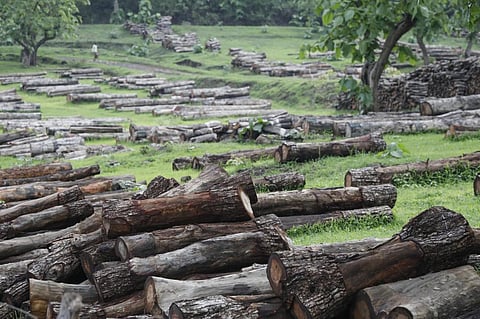

The world’s largest financial institutions boosted their support for companies responsible for deforestation in 2021, according to a new report.
Finance for those businesses increased by more than 60 per cent between 2020 and 2021, stated the report published by the non-profit Forests and Finance Coalition October 18, 2022.
Indonesia’s pulp and paper sector and Brazil’s beef industries are the areas of major concern.
Indonesia’s forests are under threat since pulp and paper manufacturers are on a production spree. Some 80 per cent of the deforestation of Amazon forests since 1985 has been attributed to Brazil’s beef sector, according to the analysis.
An assessment of 200 prominent banks and investors revealed that most of them have failed to manage and mitigate environmental, social and governance risks (ESG).
None of the largest banks and investors involved in the high-risk — agriculture, forestry and other land use — sectors had satisfactory ESG policies in place.
Credit worth $23 billion (Rs 1,893,783,200,000) has been provided to southeast Asia’s pulp and paper sector since 2016; $53 billion for the Brazilian soyabean sector; $38 billion for the southeast Asian palm oil sector, the assessment revealed.
Banks have pumped $267 billion into forest-risk commodity companies since the 2015 Paris agreement to mitigate climate change. Investors held $40 billion in bonds and shares in forest-risk commodities as on September 2022, the report stated.
The assessment showed how “big banks and institutional investors are insensitive to the urgency of the moment.” It added that the financial sector policies remain dangerously inadequate.
“We must overhaul the rules governing bank and investor decision-making if we are to meet the global climate, biodiversity and rights emergencies we face,” said Tom Picken, a founding member of the Forests and Finance Coalition.
Royal Golden Eagle and Sinar Mas’ pulp divisions in Southeast Asia received finance from the five largest banks between 2016 and September 2022. The following are the details:
The largest banks financing Brazil’s beef giants — JBS, Marfrig and Minerva — between 2016 and September 2022 were — Bradesco ($1 billion), Santander ($774 million), HSBC ($746 million), Banco do Brasil ($723 million) and BTG Pactual ($648 million).
These groups also received investment from BNDES ($566 million), Vanguard ($60 million), Algemeen Burgerlijk Pensioen Funds ($55 million) and Black Rock ($46 million).
These financial institutions’ average score on beef policies was just one out of 10. Most of the largest banks and investors have no policies to prevent deforestation, peat degradation, forest fires and forced or child labour.
The financial sector policies are very minimal and fall well below providing protection. Regulators need to wake up and stop outsourcing the pace and scale of climate action to the financial institutions profiting from destruction.
“It is important that financial institutions put sustainability at the heart of their business strategy,” said Eric Usher, head of the United Nations Environment Programme Finance Initiative.